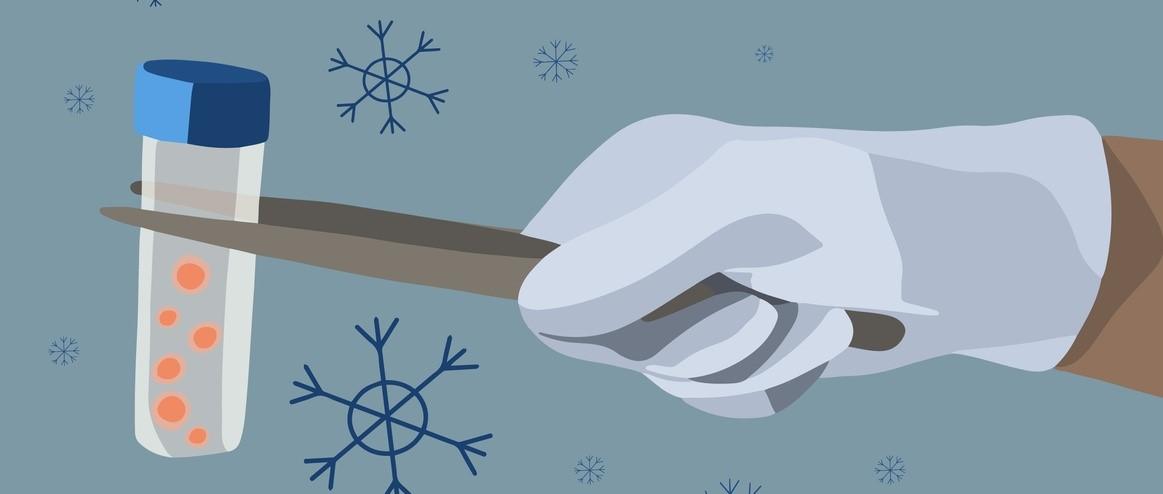
Wie häufig ist männliche Unfruchtbarkeit, und was sind die Ursachen?
Peer reviewed by Dr Krishna Vakharia, MRCGPAuthored by Amberley DavisOriginally published 9 Nov 2022
- HerunterladenHerunterladen
- Teilen Sie
Teilen Sie
Bei etwa einem Viertel aller Paare, die um ein Baby kämpfen, wird die zugrunde liegende Krankheit nicht erkannt - aber viele dieser Paare werden schließlich doch schwanger. Wir befassen uns mit den Erkrankungen, die durch Tests auf männliche Unfruchtbarkeit festgestellt werden können, mit dem Zusammenhang zwischen Krankheiten und Fortpflanzung sowie mit den Lebensgewohnheiten, die die Fruchtbarkeit gesunder Männer beeinträchtigen könnten.
In diesem Artikel:
Lesen Sie unten weiter
What is infertility?
Your fertility is your ability to conceive a baby through unprotected sex: infertility is when this becomes difficult. In most cases, it's not as straightforward as being either fertile or infertile - many factors can decrease, but not completely eliminate, your chances of having a baby.
In both men and women, fertility naturally declines with age, and for partners struggling to become pregnant, there is no clear cut-off point to say when a couple is infertile. Experts usually advise you visit your GP if you've not become pregnant after a year of trying.
Your GP may decide to test one or both of you for possible infertility causes. There are several health issues that can cause male infertility specifically, and finding a diagnosis means you can better understand your options and chances of conceiving naturally.
How common is male infertility?
When it comes to fertility problems, men and women experience them fairly equally. According to a US national survey that spanned almost 20 years, around 9% of men and around 11% of women experience fertility problems1.
Giulia Guerrini, lead pharmacist of digital pharmacy Medino, says that one in three infertility cases for couples are due to male reproductive issues; one in three infertility cases are caused by female reproductive issues; and the final third is made up of couples who are both diagnosed with health issues affecting fertility, or have both tested but aren't diagnosed with a specific cause2.
Guerrini says that despite this even spread of causes, male infertility is a difficult subject for some people to discuss.
Lesen Sie unten weiter
What causes male infertility?
What can go wrong in a man's reproductive system - the body parts that allow him to make a baby? Guerrini explains:
"Without giving a full lesson on the birds and the bees, a man's testicles produce and store sperm, which is later ejaculated by the penis to combine with a woman's egg. As such, the majority of male infertility issues are problems that affect how the testicles work."
Testicle problems could reduce or eliminate your number of sperm, make them less mobile, or prevent them from ejaculating. Abnormal sperm doesn't automatically make you 100% infertile - depending on how your sperm is affected, your fertility may be decreased, rather than gone completely.
These are some of the most common causes of testicle and sperm problems:
Varicocele - an enlarged vein in the testicle that causes less sperm to be produced than normal. Varicocele is found in around 40% of men who struggle with fertility2.
An infection of the testicles - for example, mumps can sometimes cause the testicles to become inflamed which can decrease sperm count3.
Testicles not dropping properly during puberty - if not corrected and brought down into the scrotum when young, it will cause an inability to produce sperm completely. If corrected, sperm may still be reduced in quality and number causing problems with fertility. These individuals are also at risk of testicular cancer later in life.
Scarring from surgery - for example, an inguinal hernia repair could block the ducts which carry sperm.
A hormonal imbalance - can cause a lack of sperm or blockage of sperm. For example, Kallmann's syndrome affects sex hormone levels4.
Certain inherited conditions - can affect the development and function of the testicles. For example, Klinefelter's syndrome may result in smaller than normal testicles5.
Certain sexually transmitted diseases - may affect both the quality and number of your sperm. For example, gonorrhoea and chlamydia.
Diseases and male infertility
There are also several conditions that cause many men to worry over their long-term fertility. Following are a few common examples that demonstrate how the relationship between infertility and disease is rarely simple.
Can testicular cancer cause male infertility?
According to Vincent Wolverson, CEO of testicular cancer charity It's On The Ball, it is relatively rare for this form of cancer to cause male infertility in the long-term. "The majority of men who are treated go on to lead a normal sex life and are able to produce a family, as the remaining testicle will produce healthy sperm."
However, he adds that men who undergo chemotherapy may experience temporary infertility during treatment, and that medical staff will be able to advise on this.
Patientenauswahlen für Fruchtbarkeit

Sexuelle Gesundheit
Why is egg freezing on the rise and is it safe?
In the last decade, the number of women choosing to freeze their eggs has increased tenfold. Egg freezing can offer a great opportunity, but it isn't a fail-safe insurance policy against age-related infertility. To help women decide whether this treatment is right for them and their bodies, they need clarity around egg freezing risks, success rates, and other physical, emotional, and financial factors.
von Amberley Davis

Sexuelle Gesundheit
Unfruchtbarkeit
Unfruchtbarkeit bedeutet, dass es schwierig ist, auf natürlichem Wege schwanger zu werden, obwohl man regelmäßig ungeschützten Geschlechtsverkehr hat und keine Verhütungsmittel verwendet. Es gibt keinen eindeutigen Grenzwert, ab dem ein Paar unfruchtbar ist. Bei vielen Paaren dauert es mehrere Monate, bis sie schwanger werden. Etwa 84 von 100 Paaren werden innerhalb eines Jahres nach dem Versuch schwanger. Etwa 92 von 100 Paaren werden innerhalb von zwei Jahren schwanger. Anders ausgedrückt: Etwa 1 von 7 Paaren wird innerhalb eines Jahres nach dem ersten Versuch nicht schwanger. Mehr als die Hälfte dieser Paare wird jedoch im folgenden Jahr ohne jegliche Behandlung schwanger. Wenn ein Paar trotz regelmäßigem Geschlechtsverkehr nach einem Jahr noch nicht schwanger geworden ist, schlagen die Ärzte in der Regel einige Tests vor. Wenn die Frau älter ist oder wenn es einen offensichtlichen Grund gibt, warum ein bestimmtes Paar nicht schwanger wird, egal wie lange es sich bemüht, können die Tests oder die Behandlung früher beginnen. Es lohnt sich in der Regel, einen Arzt aufzusuchen, wenn Sie nach einem Jahr der Versuche noch nicht schwanger geworden sind. Ein Arzt kann einige häufige Ursachen abklären, die Dinge besprechen und mögliche Optionen erörtern. Es kann sinnvoll sein, den Arzt früher aufzusuchen, wenn die Frau des Paares älter als 36 Jahre ist oder wenn einer der beiden Partner in der Vergangenheit Fruchtbarkeitsprobleme hatte oder an einer Krankheit wie Endometriose oder polyzystischem Ovarialsyndrom leidet, die bekanntermaßen mit Fruchtbarkeitsproblemen in Verbindung stehen.
von Dr. Toni Hazell, MRCGP
Can Crohn's disease cause male infertility?
Crohn's disease, a form of inflammatory bowel disease (IBD), is a long-term condition of the gut. The relationship between IBD and fertility is unclear and more research is needed. It's possible that the gut inflammation, the nutritional deficiencies this causes, and certain treatments including drugs and surgery could potentially impact your fertility when you have Crohn's disease.
It was also found that voluntary childlessness, not infertility, may also be contributing to lower birth rates among patients. The study suggested that this could be due to fears of those with the disease that birth abnormalities could be caused by IBD drugs and concerns of passing on the disease6.
Can haemorrhoids cause male infertility?
Haemorrhoids - also called piles - are swollen veins in your anus and lower rectum, similar to varicose veins. While there is no evidence that this directly affects your fertility, studies have linked haemorrhoids with increased rates of erectile dysfunction7, preventing you from having sex.
Both complications are treatable, meaning that any infertility troubles are usually temporary and reversible.
Lesen Sie unten weiter
Lifestyle causes of male infertility
For around one in four couples struggling to conceive, the problem can't be traced to a single health issue. This may be frustrating, but in these circumstances, doctors usually encourage couples to keep trying. Around half of couples who don't get pregnant within a year will conceive the following year.
To improve your chances, address the unhealthy lifestyle habits that are proven to increase both female and male infertility.
Dazu gehören:
Smoking - if you smoke, within your first year of trying for a baby your chance of conceiving is cut by almost half each month8.
Taking some recreational drugs - for example, cannabis and cocaine.
Taking certain medications - for example, some chemotherapy drugs. If you take regular medications, ask your pharmacist or doctor if they affect fertility.
Weitere Lektüre
Artikel Geschichte
Die Informationen auf dieser Seite wurden von qualifizierten Klinikern geprüft.
9 Nov 2022 | Ursprünglich veröffentlicht
Verfasst von:
Amberley DavisPeer-Review durch
Dr. Krishna Vakharia, MRCGP

Fragen, teilen, verbinden.
Stöbern Sie in Diskussionen, stellen Sie Fragen, und tauschen Sie Erfahrungen zu Hunderten von Gesundheitsthemen aus.

Fühlen Sie sich unwohl?
Beurteilen Sie Ihre Symptome online und kostenlos